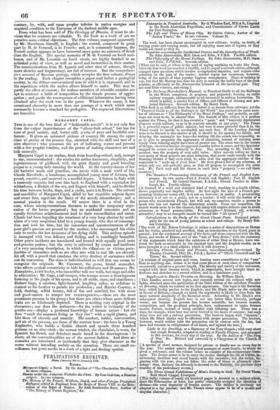MARGARET CAPEL.
Tins is one of the best kind of "fashionable novels": it is not only free from the vulgar impertinences of the "silver-fork school," but has the tone of good society, and, better still, a vein of pure and healthful sen- timent. It gives an animated picture of country life among the upper class of gentry at the present day, sketched with the skill and tact of a nice observer ; who possesses the art of indicating scenes and persons with a few graphic touches, and the power of making characters act and talk naturally.
-Margaret Capel is an orphan, fresh from boarding-school, and, strange to say, uncontaminated : she retains the artless innocence, simplicity, and ingenuousness of girlhood, with the quiet dignity and good breeding proper to a young lady entering the world. At the country-house of her old bachelor uncle and guardian, she meets with a male ward of his, Claude Havelock; a handsome, accomplished young man of fortune, but proud, sensitive, and reserved to a morbid degree. A liaison in Italy with a matronly coquette had sent him back to England with a reputation for wickedness, a disdain of the sex, and disgust with himself; andhe divides his time between books, dogs, and a yacht, quite h la Byron. The naivete and -sensibility of Margaret Capel, aided by her exquisite mignon figure and sweet face, captivate the fancy of the moody misanthrope ; and a mutual passion is the result. Of course there is a rival in the case, whose misrepresentations threaten to make the temporary sepa- ration of the lovers perpetual ; but an accidental rencontre and an equally fortuitous eclaircissement lead to their reconciliation and union. Claude had been beguiling the weariness of a very long absence by assid- uities of a very suspicious kind to a young beauty, who dies of consump- tion and love for him; but his innocence and unconsciousness of the poor girl's passion are proved by the mother, who encouraged his visits only to soothe the last moments of her dying child. This serious episode is managed with true delicacy and feeling, and is touchingly beautiful. Other grave incidents are introduced and treated with equally good taste and genuine pathos ; but the story is enlivened by scenes and incidents of a very amusing description, in which the ridiculous or vicious pecu- liarities of characters such as are often met with in real life are cleverly hit off; with a pencil that emulates the witty drollery of caricature with- out its coarseness. The class is individualized so well that one seems to recognize the originals. Mr. Casement, the gross, brutal sensualist, who affects, cynical eccentricity to hide his selfishness and ill-nature ; Mr. Humphries, a rich booby, who can neither talk nor walk, but sings and rides to admiration; Mr. Gage, a tall trooper, who tramps across a drawingroom listening to the jingle of his spurs, and is all stride, stare, and stateliness ; Hubert Gage, a careless, light-hearted, laughing sailor, as sedulous to conceal. as his brother to parade his profession ; and Harriet Conway, a bold, dashing, wilful beauty, full of fun and mischief, but with sense and good-nature to temper her extravagancies,—these are the most prominent persons in the group ; but there are others whose more delicate traits are as felicitously depicted. There is nothing very original in the characters; nor does the authoress—for the writer is evidently of the gentler sex—display a profound knowledge of human nature : but she does "catch the manners living as they rise" with a rapid glance, and hits them off cleverly and smartly. The conduct, habits, conversation, and air of the persons, are those of the current hour : the hero is a Young Englander, who builds a Gothic church and spends three hundred guineas on an altar-cloth ; the newest trinket, the chatelaine, is worn, the Spanish fan flirted, and Schubert music heard in the drawingroom : in short, all the conventionalities are of the newest fashion. And these ac- cessories are introduced so incidentally that they give character to the scene without intruding unduly on the attention. These are small ex- cellencesh but great merits in a work of a light and fleeting species.


























 Previous page
Previous page